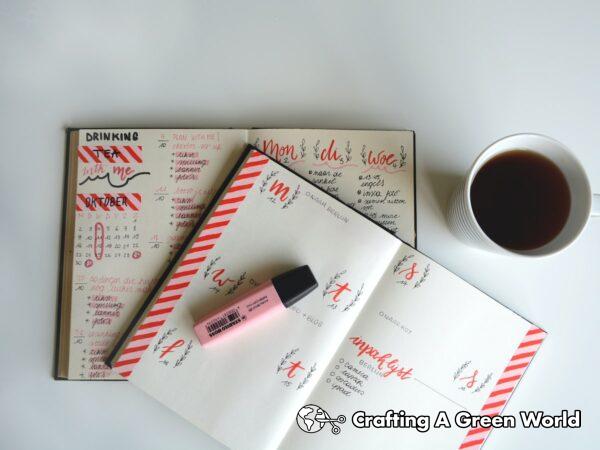Embarking on a weight loss journey can be an exciting, yet challenging experience. One of the most powerful tools in your arsenal can be a weight loss journal, providing you an avenue to reflect, plan, and document your progress.
In this article, we will share an array of weight loss journaling prompts to ignite your writing and kickstart your journey to a healthier you. Whether you’re hoping to track your nutrition, stay motivated, or gain insights into your habits, our thoughtfully compiled list of prompts will guide you.
So, fetch your journal, find a serene spot, and ready yourself for meaningful self-reflection and goal setting. Let’s navigate this path of transformation together. 🤗
Weight Loss Goals Visualization
Utilizing the technique of Weight Loss Goals Visualization in journaling aids in identifying your desired outcomes and imagining the steps you need to take to achieve them. Following are 20 prompts to assist you in visualizing your weight loss goals:
- Picture your ideal weight. Describe how you look, feel, and act at this weight.
- Describe a scenario in which you successfully resist unhealthy food.
- Envision a regular workout session for yourself. What are the exercises you are doing? How do you feel after it?
- Visualize your closet after you have achieved your weight loss goal. What types of clothes are in it?
- Picture a moment in the future when someone compliments you on your weight loss. What does it feel like?
- Write about yourself successfully managing portion sizes during a meal.
- Describe a day when you feel very comfortable in your body.
- Imagine your healthier, future self. Write a message from this person to your present self.
- Visualize an event coming up in the future. Describe how you feel attending it in your desired shape and size.
- Write about the positive changes in your health as you reach your weight loss goal.
- Describe a future self who no longer needs medication for weight-related health issues.
- Write about an incident where you feel more active and energetic due to your weight loss.
- Imagine the first time you will be able to fasten your favorite pair of jeans after losing weight.
- Visualize a future scenario where you are happier with your image in the mirror.
- Imagine eating a healthy, nutrition-packed meal. How does that make you feel physically?
- Write about small, daily activities becoming easier as you become fitter.
- Describe yourself in an exercise routine you find challenging today but can easily accomplish in the future.
- Write about the steps you will take when tempted to fall back into old, unhealthy habits.
- Visualize your reaction when you see a lower number on the weighing scale.
- Draw a word picture of yourself confidently engaging in a physical activity you currently avoid due to your weight.
Motivational Techniques For Weight Loss
Motivational techniques for weight loss, when integrated into daily journaling, can amplify self-awareness, ignite self-improvement and create a sustainable momentum towards achieving health goals. Here are 20 journaling prompts to inspire your weight loss motivational techniques:
- Write down your ultimate weight loss goal. Why is that goal important to you?
- List three non-scale victories you hope to achieve by losing weight.
- Describe an image of your healthier self. What does life look like at your goal weight?
- Write a letter to your current self from your future self who has achieved the weight loss goal.
- Jot down a motivational mantra for yourself to recite during challenging moments.
- List five positive changes you’ve noticed since you started your weight loss journey.
- Reflect upon a time you overcame an obstacle in your weight loss journey. How did it make you feel?
- Imagine your life five years from now. How will losing weight change your future?
- Write about any fears you have about weight loss and how to overcome them.
- Pen a letter of gratitude to your body, acknowledging all it does for you.
- Identify three obstacles that could prevent you from achieving your weight loss goal. How can you overcome them?
- Recall an instance when you successfully resisted an unhealthy temptation. How did you do it?
- Write about ways to reward yourself for reaching weight loss milestones that aren’t food-related.
- Picture a time when you felt truly happy with your body. How can you recreate that feeling during your weight loss journey?
- Identify five self-care activities that can support your weight loss journey.
- Reflect on the habits you need to change to achieve and maintain your desired weight.
- Write about the benefits you experience when you prioritize physical health.
- Create a go-to list of healthy foods that you can refer to when needed.
- Jot down a few motivational quotes and revisit them whenever you need a boost.
- At the end of each week, write about your progress, challenges, victories, and learnings.
Addressing Weight Loss Barriers
Addressing weight loss barriers through journaling sparks introspection, enabling you to pinpoint and overcome various hindrances that prevent successful weight reduction. Here are 20 prompts to guide you in addressing weight loss barriers through your journaling routine:
- Identify a specific weight loss barrier you're currently facing. Why is it a challenge?
- Recall a time you successfully overcame a weight loss barrier. How did that make you feel?
- Write about a weight loss goal you failed to achieve because of an obstacle. What could you have done differently?
- List three methods you could employ to overcome a current weight loss barrier.
- Reflect on any misconceptions or fears you may have about losing weight.
- Describe how your life might change if you successfully overcame all your weight loss barriers.
- What is your primary motivation for wanting to lose weight? How can this help you overcome barriers?
- Is there a specific food or eating habit that hinders your weight loss journey? Write about how you could change this.
- Do you perceive working out as a positive or a negative? Discuss your feelings towards exercise.
- Chronicle a time someone's comment about your weight affected you. How did it contribute to your current barriers?
- Imagine a conversation with your barrier. What would it say? How would you respond?
- Are there people in your life who negatively impact your weight loss efforts? How can you address this?
- Identify any emotional or mental barriers to weight loss. What steps can you take to manage these?
- Evaluate how your environment influences your weight loss efforts. Can any changes be made?
- How does your past play into your current weight loss challenges? Write about your history with dieting and exercise.
- If you could employ a personal trainer or nutritionist to help with your weight loss, what advice would you want from them?
- Reflect on why previous weight loss attempts didn't work. What have you learned from those experiences?
- Write a letter to your future self, describing how you plan to conquer your weight loss barriers.
- Discuss how lack of time has affected your weight loss journey and brainstorm solutions.
- Consider how you reward yourself. Is there a connection between rewards and your weight loss barriers? How can you develop healthier reward mechanisms?
Healthy Eating Habits
Healthy Eating Habits play a vital role in weight loss and keeping a journal with prompts can significantly improve commitment to this lifestyle. Here are 20 prompt questions for your journal to inspire healthier eating habits:
- List three new healthy dishes you'd like to try this week.
- Reflect on a successful day of healthy eating. What did you eat?
- Write about a situation where you made an unhealthy food choice. What could you have done differently?
- Describe a food that you love, but is not very healthy. How could you modify it to be more nutritious?
- Outline your perfect day of meals.
- Note your biggest challenges when it comes to maintaining healthy eating habits.
- Write about a healthy meal that you love to prepare.
- List five healthy snacks you enjoy.
- Consider a time you felt satisfied after a healthy meal, describe how you felt.
- Write about how eating healthy foods benefits your overall wellbeing.
- Note what motivates you to make healthy food choices.
- Recall an unhealthy eating habit you've successfully changed. How did you do it?
- Describe your ideal weekly meal plan.
- Write about three nutritious breakfast ideas for busy mornings.
- Reflect on why you want to develop healthier eating habits.
- List three new fruits or vegetables you'd like to incorporate into your meals this week.
- Artistically describe your favorite nutritious meal.
- Write a positive affirmation that motivates you to continue with healthy eating.
- Outline your healthy shopping list for the week.
- Reflect on how your body feels when you fuel it with healthy foods.
Tracking Fitness Progress
Tracking Fitness Progress with a weight loss journal helps you remain mindful of your journey, honing your consistency and adjustment where necessary. Here are 20 journal prompts to encourage thorough and insightful Tracking of Fitness Progress:
- How many minutes do you plan to exercise today?
- Describe the workout routine you followed today. How do you feel after completing it?
- What dietary changes are you implementing today to support your fitness goals?
- Write about any new fitness milestone you achieved today.
- How much water did you drink today, and how can you increase it if needed?
- Reflect on any obstacles you faced in your fitness routine today. How can you overcome them?
- List any physical improvements you've noticed since you started your fitness journey.
- How many calories did you consume today and how does it align with your weight loss goals?
- What are the emotional impacts of your fitness routine you observed today?
- Describe how well you followed your meal plans today.
- Make a list of ways you can incorporate more physical activity into your routine.
- What improvements in your overall health have you noticed since beginning your fitness journey?
- How consistent have you been with your workouts over the past week?
- How are you feeling physically after today's workout? Any discomfort or tension?
- Record your weight for today and reflect on the progress you are making towards your goal weight.
- Which specific parts of your body felt the most impact from today's exercise?
- What is a new fitness goal you'd like to set for next week?
- Document your sleep patterns for last night. How you can optimize sleep for better fitness recovery?
- Were there moments in the day when you felt tempted to break your fitness routine or diet, and how did you manage it?
- Write about how your increased fitness has impacted your overall quality of life.
Non-scale Victories
Non-scale victories are a powerful motivator in our weight loss journey, illuminating progress beyond the numbers on the scale. Here are 20 journal prompts to highlight your non-scale victories:
- Write about a piece of clothing that fits you better now. How does this make you feel?
- Reflect on any improvements in your health, such as lower blood pressure or cholesterol.
- Have you noticed any changes in how you feel after climbing stairs or doing other physical activities?
- Describe a recent moment when you made a healthy food choice. What prompted this decision?
- Write about any compliments or positive feedback you've received in regard to your healthier lifestyle.
- List down any improvements you've noticed in your sleep patterns or energy levels.
- Have you gained any new hobbies or interests since you began focusing on your health?
- Describe a moment when you could resist temptation and chose not to overindulge in comfort foods.
- Can you now participate in activities or go to places that were challenging before due to your size?
- Document any moments of self-love or enhanced body positivity you've experienced recently.
- How have the changes in your lifestyle positively affected your self-confidence?
- Have you noticed any improvements in your focus or mental clarity?
- Write about a time when you successfully prioritized your health over other daily distractions.
- Note down a moment when you felt strong and healthy during a physical activity.
- Have your relationships changed or strengthened as a result of your wellness journey?
- How has your success in weight loss journey influenced your future goals or life outlook?
- Write about a scenario where you took the time to prepare a healthy meal instead of opting for fast food.
- List any improvement in your overall mood or emotional wellbeing.
- Have you noticed any positive changes in your skin, hair, or overall outward appearance?
- Describe the proud moment when you realized that your efforts are showing visible results, irrespective of the scale.
Transformative Body Positivity
Transformative Body Positivity through journaling promotes self-love and acceptance, encouraging a healthier mindset towards our physical self during the weight loss journey. Here are 20 writing prompts to guide you in your self-reflective journaling process:
- List five things you love about your body today.
- Write a letter to your future self about why you are proud of your current body.
- Reflect on a moment when you felt truly confident in your body. How did it make you feel?
- Jot down three ways in which your body has served you well today.
- Think about a time you felt negative about your body. How did you heal from that experience?
- Write about an instance when you felt gratitude for your body.
- Imagine your body could talk. What would it say to you?
- List three ways you can show love to your body today.
- Reflect on a time you received a compliment about your physical appearance. How did you feel?
- Write a letter to your body, expressing your hopes for its future.
- Journal about an instance when you compared yourself negatively to others. What can you learn from that situation?
- Record five positive affirmations you would like to tell your body each day.
- Write about a moment you were proud of your physical strength. How can you encourage more of these moments?
- Contemplate on three physical features you love most about yourself. Why do you love them?
- Journal about a time you felt truly comfortable in your own skin, even if just for a moment.
- Consider a body feature you struggle with. Write a few sentences acknowledging its purpose and role in your life.
- Write down three steps towards treating your body with kindness today.
- Remember a time you admired someone for their body positivity. What about their attitude inspired you?
- Think about a relationship with a part of your body that you want to improve. What steps can be taken towards building that positive relationship?
- Reflect on the changes in your body throughout your weight loss journey so far. Journal about your emotions regarding these changes.
Overcoming Emotional Eating
Emotional eating can be a major hurdle in weight loss, but journaling is an effective strategy for recognizing triggers and breaking the cycle of emotional eating. Consider reflecting on the following 20 prompts aiming to help you overcome emotional eating:
- Recall a recent incident when you experienced emotional eating. What triggered it?
- Write down how you felt before, during, and after emotional eating.
- Identify three strategies you can use to reduce emotional eating.
- Describe a recent moment when you successfully avoided emotional eating. What alternative tactic did you use?
- Reflect on a stressful situation you face often. How could you cope with it without turning to food?
- List down three emotions that often trigger your emotional eating.
- Express your feelings around your current relationship with food.
- Imagine a perfect day without emotional eating. What would it look like?
- Conceive an affirmation that you can repeat to yourself when feelings of emotional eating arise.
- Caption a letter to yourself, acknowledging your struggles with emotional eating and offering words of encouragement.
- Define your hunger cues. Do you have physical hunger cues? Emotional ones?
- Write about the strategies that have not worked for you in overcoming emotional eating.
- Figure out a list of activities you enjoy that can serve as a distraction from emotional eating.
- Create an action plan for the next time you're feeling emotional and are tempted to eat.
- Identify and ponder upon any patterns or commonalities in past emotional eating episodes.
- Envision an alternative future where you have successfully overcome emotional eating. How are your daily routines different?
- Analyze how overcoming emotional eating would affect your overall wellbeing.
- Inspect your emotional eating triggers. Could any of them be minimized or eliminated?
- Reflect on any improvements or progress you’ve made in managing emotional eating. Even small victories matter.
- Document a pledge to show kindness and patience towards yourself as you challenge emotional eating.
Nutritional Knowledge Boost
Gaining Nutritional Knowledge Boost through a weight loss journal actively fosters healthier food choices and effective benefit tracking. Here are 20 prompts that can help you enhance your nutritional understanding:
- List down three new foods you've tried this month and their nutritional benefits.
- Reflect on your most nutrient-dense meal from the past week and why it's beneficial.
- Write about an unprocessed food you added to your diet recently and its benefits.
- What are some whole foods that have enriched your diet, and what makes them healthier?
- Write about any new nutrition facts you've learned this week.
- Describe a fruit or vegetable you learned has higher nutritional value than you thought.
- Document the benefits you've observed since incorporating more protein into your meals.
- How have your energy levels changed since improving your nutrition?
- Explain how reducing sugar from your diet has influenced your overall wellbeing.
- Think of a new recipe you tried that worked well for your health goals.
- Write about any challenges you faced when trying to balance nutrition and taste.
- Describe a time when understanding the nutritional value helped you make a food choice.
- What is one unexpected benefit you've observed from sticking to a nutrient-rich diet?
- Discuss any myths about nutrition you’ve dispelled through your personal experience.
- How is your nutritional knowledge changing your view towards processed foods?
- Discuss a compelling nutritional fact you learned about a food item you regularly consume.
- Write about any adjustments you made in your diet for better nutritional value.
- Are there any “superfoods” you plan to try? Why do they interest you?
- Reflect on the changes in your physical appearance since improving your diet's nutrition.
- What are specific ways your enhanced nutritional knowledge made grocery shopping different?
Active Lifestyle Affirmations
Active Lifestyle Affirmations in the context of weight loss journaling prompts involve motivating statements that inspire positive thinking and healthier behaviors. Here are 20 prompts to help you delve into active lifestyle affirmations:
- Conduct a visualization exercise; imagine yourself leading an active lifestyle and describe it in detail.
- Write about your favorite physical activity and why you enjoy it.
- Describe how you feel after a good workout.
- Create a powerful affirmation that motivates you to be active every day.
- Recall a time when you overcame laziness or reluctance and chose to be physically active.
- List three things you can do today to make your life more active.
- Write about how you plan to incorporate more activity into your daily routine.
- Reflect on how you feel when you maintain an active lifestyle.
- Visualize achieving a physical fitness goal and write an affirmation for it.
- Write about a skill or sport you've always wanted to learn or try.
- Create an affirmation celebrating small active living victories, no matter how minor.
- Write about what an active lifestyle means to you.
- Write an affirmation for the days when being active feels challenging.
- Reflect on a time you successfully resisted a sedentary temptation.
- Script some personal positive affirmations for choosing an active lifestyle over a sedentary one.
- Write about the long term benefits you hope to gain from living an active lifestyle.
- Create an affirmation for every time you take the stairs instead of the elevator.
- Describe how being active contributes to your overall happiness.
- Develop a statement of gratitude for your body's ability to engage in physical activity.
- Write about how you feel when you wake up knowing you have an active day ahead.
Mindful Eating Insights
Mindful eating insights gained through weight loss journaling prompts offer us a deeper understanding of our eating habits, allowing us to make better food choices. Here are 20 insightful writing prompts about mindful eating you might find useful:
- Document what you ate today. What triggered these food choices?
- Reflect on a time you ate when you weren't physically hungry. What emotions were you feeling?
- Write about a moment when you ate in response to stress. How could you manage your stress differently next time?
- Catalogue your favorite meals. What do these meals have in common?
- Describe your relationship with food in one sentence. Why did you choose that sentence?
- Write about a food that brings back a comforting memory. What makes it significant?
- Analyze a recent meal. How did it align with your health goals?
- Chronicle a time you were mindful during a meal. How did the food taste and feel?
- Track the times throughout the day that you feel the hungriest. Are there any patterns?
- Capture a moment you celebrated with food. How would you celebrate without food?
- Write about a time you felt guilt after eating. What would you tell yourself in that moment now?
- Meditate on a meal you savored. How can you incorporate that mindfulness into future meals?
- Detail a recent decision to eat healthily. What was your process?
- Describe a situation when you overate. What was your thought process before, during, and after?
- Document any emotions or thoughts that come up while eating alone. How does it differ from eating with others?
- Recall a moment you ate mindfully. How did it affect your enjoyment of the meal and sense of satisfaction?
- Formulate a plan for your meals next week. What factors do you consider in your preparation?
- Report on a time you used food as an emotional balm. What emotions were you dealing with and what can you use instead next time?
- Reflect on your eating behaviors for the past week. What were your victories and challenges?
- Think about a meal you ate without distractions. Compare the experience with a time you multitasked while eating.
Self-care In Weight Loss Journey
Adopting self-care into the weight loss journey through journaling can nurture mental and physical well-being, acting as a key contributor to achieving weight loss goals. Here are 20 prompts to assist you in documenting self-care in your weight loss journal:
- Pinpoint a self-care activity that made you feel good today. What was it and why?
- Detail a time you prioritized self-care over dieting. How did it impact your mindset?
- Reflect on a situation when you should have focused more on self-care. What could you have changed?
- Describe three methods of self-care you could implement into your daily routine.
- Write a letter to yourself from the perspective of ideal healthy habits and considering your self-care routine.
- Record your current mood before and after a self-care activity. Do you notice a difference?
- Draft a self-love note to yourself, highlighting your progress within your weight loss journey.
- Draw a roadmap of your journey, marking milestones where you incorporated self-care.
- Document your favorite self-care activity and list the reasons it makes you feel better.
- Journal about a relaxing evening you have planned or would like to plan for unwinding.
- Examine a time you should have practiced self-care. What would you change now?
- Explore one thing you could do differently today to take better care of yourself physically.
- Brainstorm a list of healthy, self-care-focused substitutes for emotional eating or overeating.
- Reflect on your current physical state. How can self-care improve this?
- List three books, podcasts, or blogs about self-care that you would like to check out.
- Describe how you plan to take care of your mental health during this weight loss journey.
- Write down five affirmations that help reaffirm the importance of self-care.
- Recall a time you empathized with your body and its journey, rather than criticizing it.
- Create a song playlist that bolsters your self-care regimen and mood as part of your weight loss journey.
- Detail your perfect self-care day, taking care to include activities that refresh both the mind and body.
Exploring Weight Loss Triggers
Exploring weight loss triggers through journaling can help unveil hidden factors contributing to weight gain, facilitating individuals to develop personalized strategies for successful weight loss. Use the following 20 prompts to help uncover your weight loss triggers:
- Recall a time that a stressful event led you to eat more than you normally would.
- Reflect on whether specific emotions prompt you to engage in unhealthy eating behaviors.
- Write about a celebration or social event where you overate. How did you feel afterwards?
- Describe one food or beverage you use as comfort during challenging times.
- List three unhealthy eating habits you've noticed in your daily routine.
- Consider what factors make you prone to skipping workouts or physical activity.
- Think about the role convenience plays in your food choices.
- Reflect on a time you ate out of boredom, not hunger.
- Describe a situation where peer pressure affected your food choices.
- Write about any connections you've noticed between lack of sleep and increased hunger.
- List three ways you react to stress: does this include overeating, consuming junk food, or skipping meals?
- Think about the influence of your work environment on your dietary habits.
- Reflect on a habit that you feel contributes significantly to your weight gain.
- Write about how your mood affects your food choices.
- Are there specific situations, locations, or times that trigger unhealthy eating behaviors?
- Ponder on whether certain people or relationships influence your eating habits.
- Reflect on how your body feels after eating unhealthy foods versus nutritious foods.
- Create a list of 'trigger foods' that lead you to overeat.
- Identify coping mechanisms you can adopt instead of turning to comfort food during stress.
- Journal about the root cause of an unhealthy habit and brainstorm ways you can change it.
Fitness Aspiration Journaling
Fitness Aspiration Journaling harnesses your long-term health and fitness objectives as the focus for your entries, enabling you to channel motivation, track progress, and manage setbacks. Here are 20 prompts to utilize in pursuing your physical well-being through Fitness Aspiration Journaling:
- Describe your ultimate fitness goal. What does it feel like when you imagine achieving it?
- Write about the biggest obstacles that stand in the way of achieving your fitness aspirations.
- Detail a realistic exercise plan for the upcoming week.
- Reflect on a past fitness achievement that made you proud.
- List three nutritional changes to compliment your fitness aspirations.
- Draft a letter to your future-self that has achieved the fitness aspiration.
- Narrate how the achievement of your fitness goals will positively impact your everyday life.
- Record your current stats (weight, body measurements, time taken to run a certain distance, etc.)
- List three motivational quotes that inspire you to reach your fitness goals.
- Write about a role model whose fitness level you'd like to match.
- Plan your ideal fitness routine and how to make it part of your daily life.
- Write about how you plan to overcome feelings of laziness or procrastination that deter your fitness regime.
- Reflect on a time when you managed to stay motivated through a tough workout period. How did you do it?
- Detail the positive changes in your mental health due to your current fitness regime.
- Chronicle your fitness aspirations progress for the past month.
- Map out the nutritional plan you need to follow to compliment your fitness aspiration.
- Write about the physical activities you enjoy the most and how to incorporate them into your workout routine.
- Recognize when and why you’ve struggled to maintain your fitness routine in the past. What can you do differently this time?
- Reflect on the ways in which your life will change once you've reached your fitness aspirations.
- Close your eyes, envision you’ve achieved your fitness aspirations. Describe how this version of you looks, feels, and moves through their day.
Beliefs About Weight And Body Image
Beliefs about weight and body image can significantly impact how individuals feel about themselves and their progress on their weight loss journey. Here are 20 journaling prompts to explore and alter these beliefs for improved self-perception and motivation:
- Describe your current beliefs about your weight and body image.
- Reflect on what formed these beliefs?
- In what ways have these beliefs affected your self-esteem?
- How have your beliefs about your body influenced your weight loss goals?
- Write about a time when your beliefs about body image negatively affected a situation.
- List three things you appreciate about your body as it is now.
- Note down five positive adjectives that you wish to associate with your body image.
- Write a letter to your future self after achieving your weight loss goal.
- Reflect on the possibility of your weight not defining your self-worth.
- What would change if you let go negative beliefs about your weight?
- Write about a belief regarding your weight that you wish to let go.
- How would life look like if you believed your weight does not determine your attractiveness?
- Note down three changes you can work on that are not weight-related.
- If your body could talk, what do you think it would tell you?
- Reflect on the idea of separating health from size.
- Write about a moment when you felt comfortable with your body. What made that moment special?
- What is your body capable of regardless of its size?
- Write an affirmation that encourages a positive attitude towards your body.
- How can you use your journal entries to alter your current beliefs?
- Reflect on how setting small, achievable health goals could change your beliefs about your body over time.
Celebrating Weight Loss Milestones
Celebrating weight loss milestones through journaling cultivates a positive relationship with fitness goals, fostering a sense of pride and accomplishment throughout the weight loss journey. In that spirit, here are 20 writing prompts centered around celebrating and reflecting on your weight loss milestones:
- Describe the feelings and emotions that surged when you first hit a weight loss milestone.
- Reflection: What specific changes in your lifestyle facilitated reaching this weight loss milestone?
- Write a congratulatory letter to yourself.
- Reflect on how your self-image has evolved with this achievement.
- Detail three elements that contributed to your success in reaching this milestone.
- Describe an instance where you could physically feel the difference because of your weight loss.
- How has achieving this milestone affected your everyday life?
- Write about one unexpected benefit you've observed from meeting your weight loss milestone.
- Draw up three new objectives you're keen on reaching next.
- Recall a moment when someone noticed your weight loss without you mentioning it. How did that make you feel?
- Detail a non-scale victory that coincided with this weight loss milestone.
- Write down your favorite healthy meal that helped you reach your milestone.
- Describe a time when you felt a surge of motivation and energy towards achieving your goals.
- How do you plan to celebrate this achievement?
- Reflect on a moment of self-doubt on your journey and how you overcame it.
- Write about any habits you had to change or give up to reach this milestone.
- Reflect on the most challenging part of your journey so far.
- Describe an old outfit that fits you better since your weight loss.
- Write a message of motivation and encouragement to yourself for the next stage of your journey.
- Reflect on the ways this milestone has impacted your mental health and self-esteem.
Overcoming Weight Plateau Frustrations
Addressing the frustrations of a weight loss plateau through journaling allows us a constructive way to vent, strategize and continue pushing forward. Here are 20 prompts to guide you in managing weight plateau frustrations through journaling:
- List the emotions you are currently feeling about your weight plateau.
- Write about a previous time you've overcome a challenge. How did you do it?
- Draft a letter to your future self who has successfully navigated past this plateau. What advice would they give you?
- Jot down three positive things about your body that aren't related to your weight.
- Identify any habits that may be contributing to your weight plateau.
- Reflect on the health benefits you have gained so far on your weight loss journey.
- Write a paragraph on how your life might change once you overcome this plateau.
- Examine the triggers that could have led to this state of weight stagnation.
- Describe the steps you will take this week to help overcome your weight plateau.
- Visualize reaching your weight loss goal. Write down how it feels.
- List five ways you can reward yourself that doesn't involve food or drink.
- Detail three dietary changes you can implement this week to potentially break through your plateau.
- Narrate a comforting dialogue between you and your body.
- Sketch out a new workout routine to jumpstart your progress.
- Enumerate the actions you will avoid repeating to prevent another weight plateau from happening.
- Write about a positive affirmation that you can tell yourself daily during this plateau.
- Explore how stress or emotional ups and downs might play a role in your weight loss plateau.
- Make a note on how you can further incorporate mindfulness into your meals.
- Design a new routine that involves more activity and less inactivity throughout your day.
- Create a game plan of how to stay motivated and patient during this phase of weight stagnation.
Positive Self-talk For Weight Loss
Positive self-talk for weight loss involves motivating oneself in a positive manner to stay consistent with weight loss activities by journaling. Here are 20 prompts to guide you in cultivating positive self-talk for weight loss:
- List out five strengths that will aid your weight loss journey.
- Describe a time when you overcame a tough challenge. How can this apply to your weight loss effort?
- Write down three kind words or phrases that you can tell yourself whenever you feel like giving up.
- Note down your favorite healthy meal and why you love it.
- Detail a fitness achievement you are proud of, no matter how big or small.
- Write about the ways you will reward or celebrate yourself after hitting your weight loss goals.
- Describe a moment where you made a healthy choice over an unhealthy one. How did it make you feel?
- List out three reasons why your weight loss journey is important to you.
- Write down the positive impacts of your weight loss on your health and well-being.
- Envision your life a year from now, having successfully lost weight. Describe it.
- Write a compassionate letter to the current you from your future self, highlighting the benefits of this weight loss journey.
- Recall the healthiest moment of your past week. Why was it successful?
- Write down three positive things that physical exercise does for your body and mind.
- Reflect on a workout that you really enjoyed. What made it enjoyable?
- Write about a moment where you didn’t let temptation sway your dedication.
- Write down three affirmations that inspire you to continue the path of weight loss.
- Note down all the fun activities you can do or are doing with your newfound energy.
- Write about how losing weight will positively impact your confidence.
- Describe three qualities you possess that will make this weight loss journey successful.
- Write a letter of encouragement to yourself for those future moments where you might struggle with motivation.
Psychological Aspects Of Weight Loss
The psychological aspects of weight loss are crucial to uncover and address through journaling prompts, to facilitate a healthier and more mindful approach to shedding pounds. Here are 20 writing prompts that focus specifically on the psychological aspects of weight loss:
- Describe an emotion you associate with food and its impact on your eating habits.
- Think about a recent time you ate out of stress or boredom. How could you handle it differently next time?
- How do societal pressures about weight and appearance affect your self-esteem?
- Write about a non-scale victory you've had recently (better fitting clothes, more energy, etc.).
- Identify three negative thoughts you often have about your body and try to counteract them with positive affirmations.
- How does your perceived self-image impact your daily interactions and overall mood?
- Describe an incident where you punished yourself due to eating 'bad' food. How can you approach this differently?
- Do you use food as a reward? Write why or why not, and whether it's a healthy approach.
- How has your relationship with food changed over time?
- Discuss a time when you've compared your weight loss journey with someone else's. How did this make you feel?
- Write about your perceived failures in your weight loss journey and how they affected you psychologically.
- Identify emotions or situations that trigger overeating, and brainstorm strategies to combat these triggers.
- Write about a time you felt proud due to a healthy lifestyle choice.
- Do you associate weight with happiness? Delve into the reasons for why you feel this way.
- How do you feel when you have to say no to a food you enjoy but know is unhealthy?
- Describe a recent situation where you felt strong and in control of your eating habits.
- Are you hard on yourself when you deviate from your eating plan? Write about how you can practice self-compassion.
- Think about support systems in your weight loss journey. Write about a time when someone's support or lack thereof affected your progress.
- How does the physical act of journaling about your weight loss make you feel?
- Reflect on your overall relationship with food and weight. Leaning on kindness and grace, write about how you hope this relationship will evolve.
Benefits Of Regular Exercise
Committing to regular exercise can improve not only our overall health, but can also be an effective method for weight loss, as consistent physical activity stimulates the metabolism and burns calories. Consider the following 20 writing prompts to help you understand and appreciate the benefits of regular exercise:
- Record how you are feeling right after completing a workout. What physical or emotional changes do you notice?
- Write down what motivated you to exercise today. Was it a specific goal, a person, or something else?
- Reflect on your most worthwhile workout this week. Why was it successful?
- Jot down three health benefits you’ve noticed since integrating regular exercise into your routine.
- Write about a physical activity you would like to try and why.
- Consider a time when you didn’t feel like exercising but did it anyway. How did you feel afterwards?
- Detail any physical improvements you’ve observed since starting regular exercise.
- Record your favourite exercise and explain why you enjoy it.
- Chronicle a workout that was particularly challenging and how you overcame it.
- Write about ways you can integrate more physical activity into your daily routine.
- Reflect on your short-term and long-term fitness goals.
- Describe any mental or emotional benefits you’ve noticed from regular exercise.
- Discuss any improvements in your diet or eating habits since maintaining an exercise routine.
- Detail how you stay motivated to stick with your workout regime.
- Write about a recent workout that you’re proud of and why.
- Consider and record ways you could ramp up your current workout routine.
- Reflect on any weight loss you’ve noticed since beginning regular exercise.
- Acknowledge any physical activities that you’ve improved at and how that makes you feel.
- Write about your favorite time of day to workout and why.
- Write a letter to future you, detailing why regular exercise is important.
Rethinking Food Relationship
Rethinking our relationship with food can have a profound impact on our weight loss journey and mental health, by acknowledging the emotional, cultural, and physical impacts of our eating habits. Here are 20 journaling prompts to assist in scrutinizing and improving your food relationship:
- Describe how you felt about food growing up, and whether those feelings have changed.
- How does your mood affect your food choices and why?
- List three negative food habits you would like to change.
- What are three positive food habits you already possess?
- Write about a time when you used food to cope with stress. How did it make you feel afterwards?
- Reflect on strategies that could help you to reduce emotional eating.
- How does your physical health influence your food choices?
- Write about a positive food-related memory and the emotions tied to it.
- Explore how societal norms or family influences have shaped your eating habits.
- Describe a food you feel you eat excessively. Why do you think you over-indulge?
- Brainstorm healthier alternatives for your most commonly craved foods.
- Document any feelings of guilt or regret you've had after eating certain foods.
- Jot down ways you could reward or indulge yourself that doesn't involve food.
- Consider if your eating habits align with your values. If not, which habits would you like to change?
- How do holidays or celebrations impact your eating habits?
- What triggers the urge to snack even when you're not hungry?
- Write about your favourite meal, considering both the physical and emotional satisfaction it provides.
- Reflect on recent progress made towards transforming your food relationship.
- Consider how better food choices could affect your energy levels and daily activities.
- Thinking about the future, write about how a healthier relationship with food might transform your life.
Role Of Sleep In Weight Loss
Tracking the role of sleep in your weight loss journey allows you to monitor how rest impacts your fitness goals and overall wellbeing. Here are 20 prompts focused on the subject:
- Reflect on the quality of your sleep last night. How do you think it affected your productivity today?
- Write down any patterns you've noticed between your sleep hours and your energy levels the next day.
- Describe the ideal sleep routine that you believe would aid your weight loss.
- Create a list of wind-down activities that you can try before bedtime.
- Analyze how your sleep schedule has changed since you started your weight loss journey.
- Consider last week's sleep data. Did you get enough rest? How are you planning to adjust?
- Draft a bedtime routine that suits your lifestyle and weight loss goals.
- Write a letter to your future self about the importance of good sleep routine for weight loss.
- Record any dreams or sleeping issues like insomnia or sleep apnea.
- Review a time when inadequate sleep led you to make unhealthy food choices.
- Document how your mood varies with different amounts of sleep.
- Make a plan of action for nights when you can't fall asleep within your usual time.
- Consider if there are external factors affecting your sleep quality (noise, light, stress) and brainstorm solutions for those issues.
- Draft a commitment to maintaining a regular sleep schedule for a week and note down the changes you observe.
- Reflect on the connection between good sleep and successful weight loss.
- List down three consequences of not getting enough sleep that impact your weight loss efforts.
- Record how you feel immediately after waking up from a good night's sleep, noting any effects on your appetite or craving.
- Contemplate how getting adequate sleep can contribute to a healthier lifestyle.
- Ponder about any correlations between your sleep cycle and body changes you've observed.
- Write about your best sleep experience in the past month and how it affected your fitness routine the following day.
Meditation For Weight Management
In the realm of weight management, meditation can serve as a powerful tool for enhancing mindfulness, promoting a healthier relationship with food and facilitating positive changes in eating habits. Here are 20 journal prompts to help you incorporate meditation into your weight loss journey:
- Reflect on your first meditation experience. How did it make you feel?
- Describe any changes in eating habits you've noticed since starting your meditation practice.
- Write about a time when meditation helped you resist the urge to overeat.
- List three ways meditation has improved your relationship with food.
- Detail a meditation session that felt particularly empowering. Why was this so?
- Consider a situation where you mindlessly ate. How could meditation have changed this scenario?
- Record your thoughts and feelings immediately after a meditation session.
- Write a letter to yourself about your weight loss journey, expressing kindness and encouragement.
- Discuss any emotions that surfaced during meditation. Do they relate to food in any way?
- Detail the connection you feel between meditation and your weight loss journey.
- Explore how meditation has affected your perception of food.
- Discuss any resistance or challenges you're experiencing with your meditation practice.
- Reflect on the methods of meditation that seem to resonate most with you.
- Write about your favorite mindfulness exercise and how it contributes to your weight management.
- Detail your meditation routine or practice. How has it evolved?
- Describe the most peaceful moment you've had during meditation.
- Write about the realization or insight you gained through meditation about your eating habits.
- Describe the difference in how you react to food cravings before and after starting meditation.
- Reflect on what role food plays in your life now, as compared to before you started meditating.
- Finally, write about how meditation has assisted you in achieving your weight loss goals.
Gratitude In Weight Loss Journey
Recognizing and expressing gratitude in your weight loss journey can enhance your connection to your body and your health, promoting positive emotions and resilience. Here are 20 prompts centered around gratitude in your weight loss journey:
- Write about what you're most grateful for in your journey towards a healthier lifestyle.
- Describe a moment in your weight loss journey that you were thankful for.
- List three things about your body that you are grateful for.
- Reflect on a time you expressed gratitude for your health. How did this impact your perspective on your weight loss journey?
- Write about someone who has been a positive influence or supportive in your weight loss journey. Why are you grateful for them?
- Describe a habit that you're trying to cultivate. Why are you thankful for the opportunity to improve this aspect of your life?
- List one thing you’ve gained from the challenges you've faced in your weight loss journey, and why you’re grateful for it.
- Recall a moment of self-loving thought you had recently. Describe why it made you feel grateful.
- Note down a non-scale victory you are grateful for.
- Reflect on how your attitude towards food has evolved. Why does this spark gratitude within you?
- Identify a personal skill that your journey fostered, and express your gratitude for it.
- Write about a time you felt connected to your body and why you're thankful for that feeling.
- Describe a physically demanding task you can now perform with ease, and express your gratitude for this ability.
- Note down a perceived flaw that you’ve come to appreciate.
- Reflect on how increased self-esteem has affected your life outside the issues of weight and health. Why are you grateful for this?
- Write about an unexpected benefit of your weight loss journey that you’re thankful for.
- List five things about your new lifestyle that bring you joy.
- Write a thank you letter to your body for its strength and resilience during this journey.
- Reflect on why you're thankful for the path that led you to decide to lose weight and become healthier.
- Note down some gratitude for your own persistence and commitment in this weight loss journey.
Addressing Body Shaming Experiences.
Addressing Body Shaming experiences through journaling can be a powerful tool for self-healing, promoting positive self-image, and fostering better mental health. Below are 20 prompts to assist you in reflecting on and processing your experiences:
- Write about your earliest memory of body shaming. How did it make you feel?
- Describe a situation where you were body shamed, and how it affected your self-image.
- Reflect on an experience where you stood up against body shaming. What prompted you to take a stand?
- Put into words the emotions you feel when you remember a body shaming incident.
- Record an event when someone defended you against body shaming. How did it make you feel?
- Consider a time when you engaged in body shaming, either by shaming yourself or someone else. What led you to act this way?
- List three affirmations you can repeat when you feel affected by body shaming.
- Describe a situation where you reclaimed confidence after a body shaming incident.
- Write a letter to your younger self about the concept of body shaming and provide words of encouragement.
- Document a moment when you felt proud of your body, regardless of societal standards.
- Compose a poem or short story that embodies body positivity.
- Describe the pressures you feel from societal expectations and how they influence your self-image.
- Developing empathy: Write about how you would feel if you were in the shoes of someone body shaming you.
- Think about an instance where body shaming took a toll on your mental health. How did you handle it?
- Explore your journey towards self-love and self-acceptance.
- Discuss the resources and practices that have helped you deal with body shaming.
- Envision a world free of body shaming. What does it look like?
- Jot down a pledge to practice body positivity and discourage body shaming.
- What are some positive routines you can adopt to foster body appreciation?
- Write a kind, compassionate letter to your body, acknowledging all it does and has done for you.











